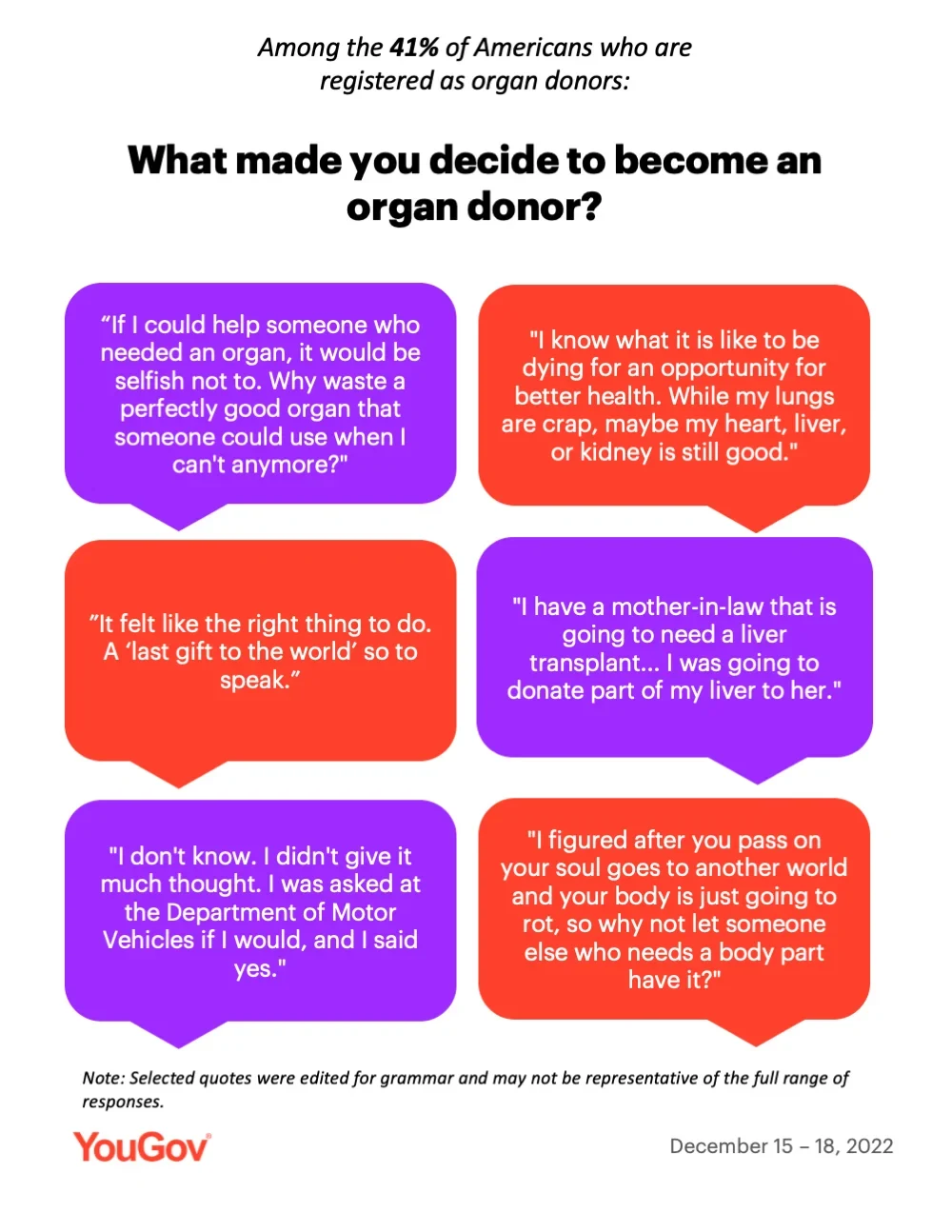There was a record number of organ transplants performed in the United States in 2022, but there are still more than 100,000 people awaiting transplants across the country. Organ donation — the act of giving someone an organ during the donor's life or after the donor has died — has the potential to save lives, but many Americans remain hesitant to become donors.
A YouGov survey of 1,000 U.S. adult citizens conducted in December 2022 shows that about two in five Americans (41%) say that they are registered as organ donors. Slightly more people are not registered as donors (46%), with the rest either uncertain about their status (7%) or preferring not to disclose that information (6%).
Registering to be an organ donor is more common among older adults, white Americans, and women. People who are 30 and older (45%) are more likely than younger adults (25%) to be registered as an organ donor. White Americans (49%) are more likely than Hispanic (29%) or Black Americans (16%) to be registered, and women (45%) are slightly more likely than men (37%) to be registered.
In an open-ended question, YouGov asked registered organ donors why they had decided to register. Common themes mentioned among the 41% of Americans who are registered donors include deciding to become organ donors out of a desire to help others. Some people became donors because they knew someone who needed a transplant, and many people give the reason of no longer needing their organs after death.

One-third of Americans (34%) know someone who has received an organ donation. Nearly three in 10 (29%) Americans know someone who donated an organ upon their death, and 28% know someone who has become a living organ donor, including themselves; 39% know a donor of either sort and 17% know both. People who are registered as organ donors are more likely than people who are not registered to know each of three groups of people who have given or received donations — more likely to know living donors, donors after death, and recipients.
In an open-ended question, YouGov asked non-donors why they had decided not to register. Among the most common reasons listed among the 46% of Americans who are not organ donors was a general distrust of the medical industry, such as concerns that doctors will not try as hard to save them if the doctors know their organs could be used for donation. Others said that they believe their personal health conditions or age would make them ineligible for donation, while many expressed a general lack of knowledge about organ donation.
YouGov asked people — donors and non-donors alike — about various myths about organ donation to understand some of the possible hesitations around becoming a donor, including the prevalent idea that doctors are less likely to give life-saving care to registered donors than to people who remain unregistered.
Americans who are currently registered as donors are much more likely than people who are not registered as donors to believe that donors and non-donors are "about as likely" to receive life-saving care by doctors (56% of registered donors say this vs. 36% of non-donors). People who are not registered as donors are also more likely to say registered donors are "less likely" to receive life-saving care (7% of registered donors say this vs. 14% of non-donors).
A majority of Americans (55%) believe that organ donors are required to be in good health at the time of donation. Registered donors (57%) and non-donors (57%) are equally likely to believe that organ donors are required to be in good health. And 57% of Americans think organ donors should be required to be in good health at the time of donation, including 57% of registered donors and 61% of non-donors.
— Carl Bialik and Taylor Orth contributed to this article
Related: Comparing American and British attitudes on health care in 2022
See the results from this YouGov poll conducted on December 15 - 18, 2022
Methodology: This poll was conducted online on December 15 - 18, 2022 among 1,000 U.S. adult citizens. Respondents were selected from YouGov’s opt-in panel using sample matching. A random sample (stratified by gender, age, race, education, geographic region, and voter registration) was selected from the 2019 American Community Survey. The sample was weighted according to gender, age, race, education, 2020 election turnout and presidential vote, baseline party identification, and current voter registration status. Demographic weighting targets come from the 2019 American Community Survey. Baseline party identification is the respondent’s most recent answer given prior to March 15, 2022, and is weighted to the estimated distribution at that time (33% Democratic, 28% Republican). The margin of error for the overall sample is approximately 3%.
Image: Adobe Stock (SewcreamStudio)










